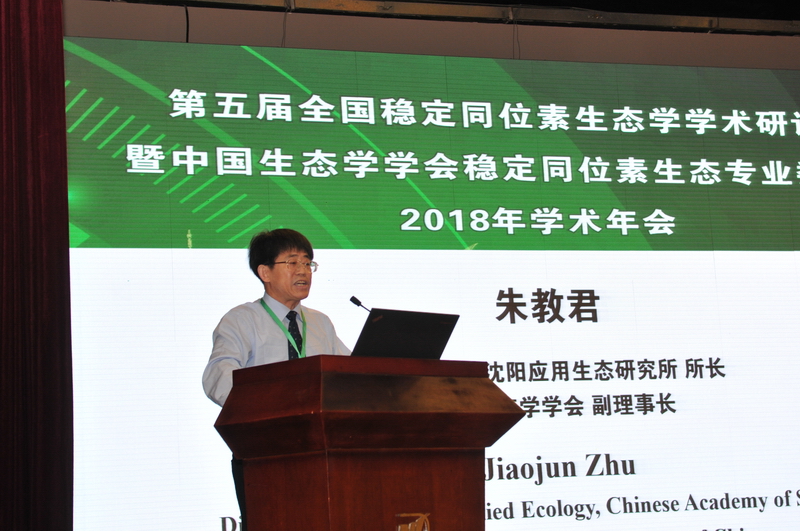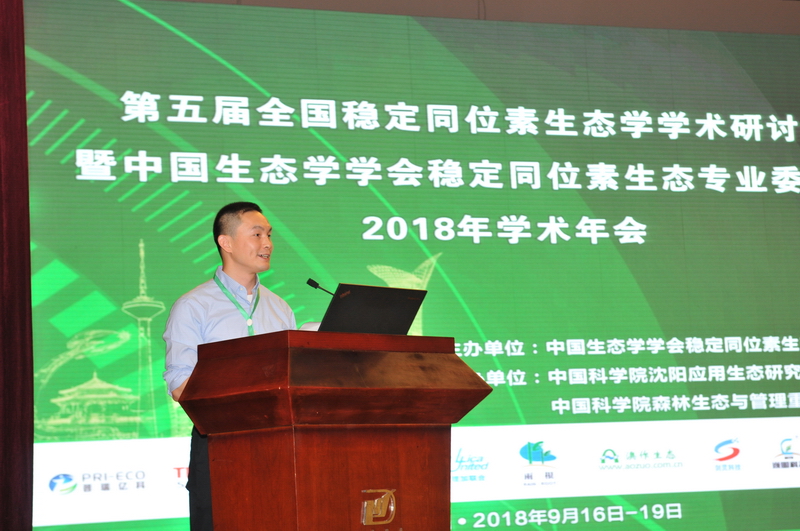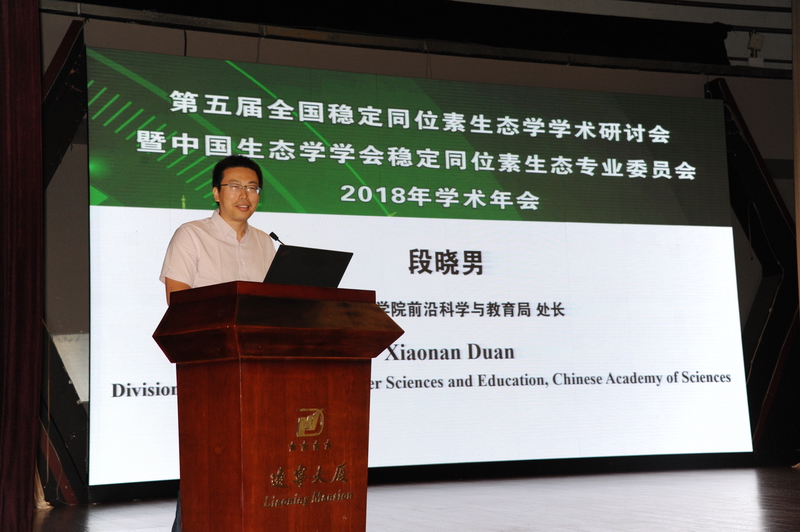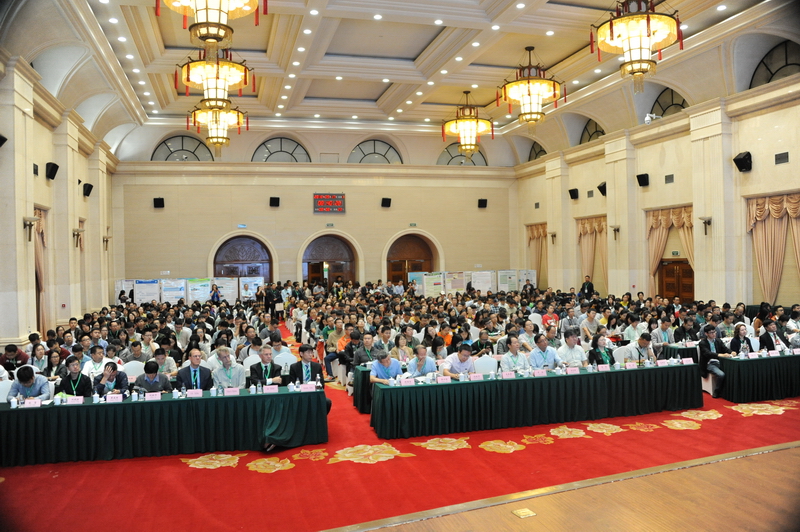The 5th National Symposium on Stable Isotope Ecology in Shenyang, China
On September 16th to 19th, 2018, the "5th National Symposium on Stable Isotope Ecology and Annual Committee Meeting of Stable Isotope Ecology of Ecological Society of China" was held in Shenyang, China. LUO Jing, Director of the Second Division of the Life Science Department of the National Fund Committee; HAN Xingguo, former director of the Institute of Botany and Institute of Applied Ecology, the Chinese Academy of Sciences (CAS); DUAN Xiaonan, Director of the Department of Earth Sciences of Frontier Science and Education Bureau of the Chinese Academy of Sciences; ZHANG Gang, Director of Social Development of Science and Technology Department of Liaoning Province; Professor LIN Guanghui of Tsinghua University and chairman of Stable Isotope Ecology Committee of the Ecological Society of China; ZHU Jiaojun, Director of the Institute of Applied Ecology of Chinese Academy of Sciences, and FANG Yunting, Deputy Director of the Institute of Chinese Academy of Sciences, and other distinguished guests presented in the meeting. In total, 555 experts and scholars in the field of stable isotope from China, Denmark, Norway, Japan, Australia, the United States of America participated in the conference.
This conference was organized by the Stable Isotope Ecology Committee of Ecological Society of China, and co-organized by Institute of Applied Ecology of CAS and Key Laboratory of Forest Ecology and Management of CAS. In recent years, stable isotope technology is gradually becoming a powerful tool in the research field of matter circulation, climate change, environmental pollution. The application of this technology can solve ecological and environmental problems that are difficult to resolve by traditional research methods, and which greatly increasing our understanding and perception of the unknown world. The convening of this year’s National Symposium on Stable Isotope Ecology will strengthen the exchanges between stable isotope ecologists in China and abroad, and track the frontier research of stable isotope research in a timely manner and promote the application of stable isotope technology in relevant research fields.
The opening ceremony on September 17th was hosted by FANG Yunting, Deputy Director of the Institute of Applied Ecology, CAS. Firstly, Professor ZHU Jiaojun, director of the Institute of Applied Ecology, CAS, gave a warm welcome speech to all participants. He first welcomed the participants on behalf of the conference organizers and conveyed the congratulations of Professor OUYANG Zhiyun, chairman of the Ecological Society of China. He also thanked Professor LIN Guanghui, the chairman of the Stable Isotope Ecology Committee of Ecological Society of China, for his promotion of the application of stable isotope technology in ecological research in China. Prof. ZHU then introduced the research teams that successfully applied stable isotope techniques to obtain promising results in the Institute of Applied Ecology, CAS, and then briefly introduced the history and current situation of the institute.
Then, DUAN Xiaonan, Director of the Department of Earth Sciences of the Frontier Science and Education Bureau of Chinese Academy of Sciences, delivered a speech on behalf of Chinese Academy of Sciences. He briefly reviewed the development of stable isotope techniques and their application in different disciplines, pointing out the importance of unremitting perfection of stable isotope research methods and the pursuing of frontier research. Lastly, He encouraged researchers in the field of ecology to have a questioning spirit.
Professor LIN Guanghui, Chairman of the Stable Isotope Ecology Committee of Ecological Society of China and professor of Tsinghua University, delivered the first invited speech of the conference. He briefly reviewed the history of the National Symposium on Stable Isotope Ecology, pointed out that the application of stable isotope technology has been deepened and the research team has grown stronger. He called on scholars to promote the application of stable isotope technology and play its due role to solve social and general public's livelihood issues and problems. Following his report, 19 invited reports were given by professors from home and abroad, including Professor Jan Mulder from Norwegian University of Life Sciences, gave a report entitled “Using in situ 15N to trace NO and N2O emissions from N-saturated, acid forest soils in Southwest China”; Professor Meredith Hastings from Brown University, USA, gave a report entitled “Investigating the isotopic composition of reactive nitrogen compounds in the atmosphere: new methods and applications”; Dr. Mang Lin from Tokyo Institute of Technology gave a report entitled “Use of radioactive isotopes to understand stable isotope effects for tracking the evolution of planetary atmospheres and origin or life”; Professor Zhihong Xu from Griffith University, Australia, gave a reported “Complex and dynamic effects of climate change and local environment on carbon and nitrogen cycling in different terrestrial ecosystems”; Professor Erik Hobbie from University of New Hampshire, USA, gave a report entitled “Nitrogen and carbon sources and supply in agricultural weeds and in mycorrhizal fungi”; Professor Keisuke Koba from Kyoto University reported his research on the topic “Nitrogen and oxygen isotope tracers to study nitrogen recycling in grasslands”.
This conference also included 7 sessions, which were “Carbon isotope and its application in terrestrial ecosystems”, “Nitrogen isotope and its application in terrestrial ecosystems”, “Water isotope and its application in terrestrial ecosystems”, “Stable isotope study of greenhouse gases”, “Atmospheric science of the Stable Isotope Study, “the Stable Isotope Study of Ocean and Water Ecology and the Application of Stable Isotopes in Product Traceability and Screening”. These sessions contain 71 oral presentations and 39 posters, and in-depth discussions were held by participants in the above research areas.
National Symposium on Stable Isotope Ecology and Annual Committee Meeting of the Stable Isotope Ecology of the Ecological Society of China has long been recognized as the grand gathering of researchers of stable isotope in China. The first Stable Isotope Ecology Seminar was initiated by Professor LIN Guanghui and co-hosted by Institute of Botany of CAS and Chinese Academy of Forestry in Beijing, in 2008. Since the first seminar was successfully held, it has attracted more and more ecological researchers to participate in the gathering. In 2014, the second Stable Isotope Ecology Seminar was hosted by the Earth Science Research Center of Tsinghua University. At the meeting, many participants initiated the foundation of Stable Isotope Ecology Committee of Ecological Society of China. The committee was established in the following year and affiliated with the Earth System Research Center of Tsinghua University. Professor LIN Guanghui was elected as the chairman of the committee. This year’s conference is the third annual meeting after the establishment of the Stable Isotope Ecology Committee. With more than 500 participants, it has surpassed the previous events, demonstrating the growing usage of stable isotope technology in research fields like ecology and environmental science. The application of stable isotope in ecology research is more extensive and increasing. The application fields of stable isotope are rapidly expanding to pollutant tracking, quality identification of agricultural and forestry fishery products and traceability of origin, etc., that are closely related to ecological safety, environmental health and food safety.
With the powerful analytical capabilities of stable isotope techniques, several research teams of the Institute of Applied Ecology of the CAS have been using this technology to study the carbon and nitrogen cycles of different types of ecosystems, and have achieved a series of fruitful results. Such as FANG Yunting quantified the denitrification rate on different forest ecosystem scales using the nitrate-nitrogen stable isotope natural abundance technique, and gave a new idea and way to quantify the nitrogen loss of the ecosystem. The relevant results were published in PNAS (Proceedings of the National Academy of Sciences). The Institute of Applied ecology has established a mature stable isotope analysis system equipped with multiple isotope analysis mass spectrometers. This system is capable of analyzing δ13C and δ15N in solid sample, various forms of nitrogen δ15N in liquid samples, δ13C, δ15N and δ18O of gas samples CO2, CH4 and N2O.




| Download the attachment: |



